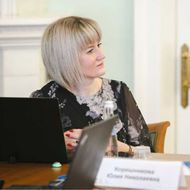Project Team of ‘Success and Self-Sustainability of the Individual in a Changing World’ Wins Russian Science Foundation Grant

Researchers from HSE University will receive funding from the Russian Science Foundation to study such forms of student employment as freelancing, self-employment, and entrepreneurship, all of which have been actively developing in recent years. The research will shed light on the new opportunities and challenges encountered by students and early-career specialists in the labour market. It will also aid in the development of effective strategies for their successful adaptation and development.
Changes in the world and the labour market mean that early-career specialists need have new skills, such as the ability to act without specific instructions and to make decisions independently. These competencies are grouped under terms such as ‘agency’, ‘independence’, ‘proactivity’, ‘initiative’, ‘entrepreneurial spirit’, etc, and are widely studied in Russia and abroad.
The increased focus on this topic is the result of changes in the economy and society, a phenomenon sometimes referred to in sociology circles as ‘destructuring’. In the labour market, this manifests as a growth in the popularity of alternative forms of work alongside traditional corporate employment. These alternative forms include platform work, freelancing, entrepreneurship, etc. In addition, so-called ‘corporate entrepreneurship’ is increasingly sought after in organisations.
However, scientists and practitioners do not fully agree on which qualities a person should have in order to be successful in new employment circumstances, nor how to develop these qualities.

In order to address these challenges, researchers from HSE University will study the trajectories of students and graduates of higher education in new social and economic conditions, assess the role of education in forming and supporting non-traditional forms of employment, and examine the characteristics that contribute to productive forms of agency. All of this will be done as part of the strategic project 'Success and Self-Sustainability of the Individual in a Changing World' implemented as part of the Priority 2030 programme.

Head of the Laboratory for Human Capital and Education Research at the HSE University Institute of Education and head of the research project
‘Research into non-traditional forms of employment among students has major significance in modern society, where technology—and digitalisation especially—is changing the traditional models of business processes. The results of this research can shed some light on new the new opportunities and challenges facing students and early-career specialists, as well as help to develop effective strategies for their successful adaptation and development. I am confident that this research will produce valuable theoretical and practical results.’
Yulia Koreshnikova, supervisor of the strategic project 'Success and Self-Sustainability of the Individual in a Changing World', explains that the researchers have set themselves a range of tasks, including testing theoretical models for describing the work paths of students, identifying the most common types of non-traditional employment, and assessing important competencies in freelancing, self-employment, and entrepreneurship for early-career specialists. The second group of tasks is related to determining the role of higher education in the formation of sought-after skills in new conditions, with the goal of determining which organisational and teaching conditions must be created to train students in higher education.

Supervisor of the strategic project 'Success and Self-Sustainability of the Individual in a Changing World'
‘Our project will help to systematise knowledge of non-traditional formats of employment and the higher education-related needs of employers, employees, and future businesspeople. We will also determine how universities can meet this challenge.’
The members of the research group headed by Pavel Sorokin are: Vera Maltseva, Yulia Koreshnikova, Natalia Shirkova, Alexandr Timofeev, Darya Pavlyuk, Timofey Redko, and Yulia Vyatskaya.
See also:
HSE Scientists Optimise Training of Generative Flow Networks
Researchers at the HSE Faculty of Computer Science have optimised the training method for generative flow neural networks to handle unstructured tasks, which could make the search for new drugs more efficient. The results of their work were presented at ICLR 2025, one of the world’s leading conferences on machine learning. The paper is available at Arxiv.org.
Neural Network Trained to Predict Crises in Russian Stock Market
Economists from HSE University have developed a neural network model that can predict the onset of a short-term stock market crisis with over 83% accuracy, one day in advance. The model performs well even on complex, imbalanced data and incorporates not only economic indicators but also investor sentiment. The paper by Tamara Teplova, Maksim Fayzulin, and Aleksei Kurkin from the Centre for Financial Research and Data Analytics at the HSE Faculty of Economic Sciences has been published in Socio-Economic Planning Sciences.
Larger Groups of Students Use AI More Effectively in Learning
Researchers at the Institute of Education and the Faculty of Economic Sciences at HSE University have studied what factors determine the success of student group projects when they are completed with the help of artificial intelligence (AI). Their findings suggest that, in addition to the knowledge level of the team members, the size of the group also plays a significant role—the larger it is, the more efficient the process becomes. The study was published in Innovations in Education and Teaching International.
Advancing Personalised Therapy for More Effective Cancer Treatment
Researchers from the International Laboratory of Microphysiological Systems at HSE University's Faculty of Biology and Biotechnology are developing methods to reduce tumour cell resistance to drugs and to create more effective, personalised cancer treatments. In this interview with the HSE News Service, Diana Maltseva, Head of the Laboratory, talks about their work.
Master’s Students of HSE, University of Campinas, and Tsinghua University Publish Joint Student Research Collection
Master’s students of the HSE ISSEK programme ‘Science, Technology and Innovation Management and Policy’ have released a joint research collection with the University of Campinas (Brazil) and Tsinghua University (China) titled ‘Being Innovative or Being on the Safe Side—Managing the Risk of Failure.’ The authors explore how organisations perceive risks and embrace innovation within different cultural contexts.
‘A Turn Away from Stereotypes’: Moscow Hosts ‘Researching the Deaf Community’ Conference
On October 17–19, 2025, the third annual interdisciplinary conference ‘Researching the Deaf Community 2025: on the Periphery of Attention’ took place at GES-2 House of Culture in Moscow. The event was organised with the participation of the HSE International Laboratory for Social Integration Research. HSE University Vice Rector Irina Martusevich addressed attendees at the opening ceremony.
Exploring the Mind: HSE Scientists Discuss Cognitive Technologies of the Future
Why we make irrational decisions, how the brain responds to fakes, and whether neural networks are capable of thinking—these were the topics discussed by early-career scientists of HSE University during the NAUKA 0+ science festival. The event brought together students and experts from various fields, united by a common goal—to deepen their understanding of the human brain and cognitive technologies.
HSE Researchers Assess Creative Industry Losses from Use of GenAI
Speaking at the IPQuorum.Music forum on October 15, Leonid Gokhberg, HSE First Vice Rector, and Daniil Kudrin, an expert at the Centre for Industry and Corporate Projects of HSE ISSEK, presented the findings of the first study in Russia on the economic impact of GenAI on creative professions. The analysis shows that creators’ potential losses could reach one trillion roubles by 2030.
International Dialogue on Urban Development: Dynamic Urbanism and Green Infrastructure
In September 2025, the HSE Faculty of Urban and Regional Development (FURD) hosted a delegation of leading scholars and urban development experts from China. Two seminars were held at the Shukhov Lab with the participation of Chinese colleagues: the first focused on green infrastructure, while the second explored the theme of dynamic urbanism. In addition, a meeting between the Chinese delegation and representatives of FURD took place at the university’s main building on Pokrovsky Bulvar. The participants discussed opportunities for expanding cooperation between universities and research centres.
HSE Tops the Ranking of Universities with the Best Employer Reputation
On October 16, 2025, Forbes Education published its list of the top 20 Russian universities with the best employer reputation in 2025. The ranking was based on a survey of leading Russian employers, who named the higher education institutions whose graduates they consider the most well-prepared and are most inclined to hire. HSE University took first place in the ranking.


